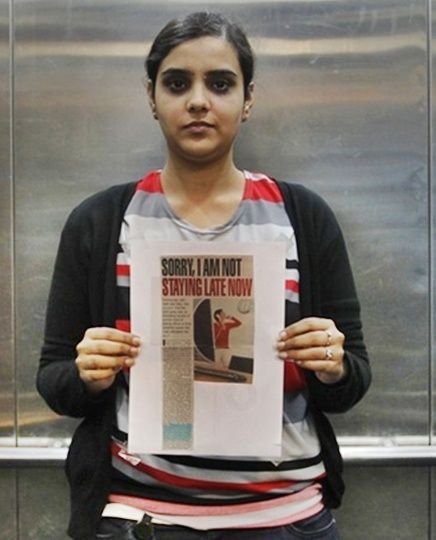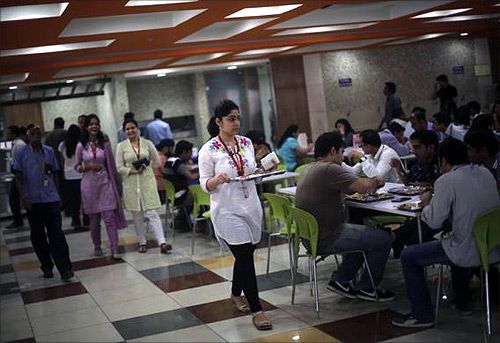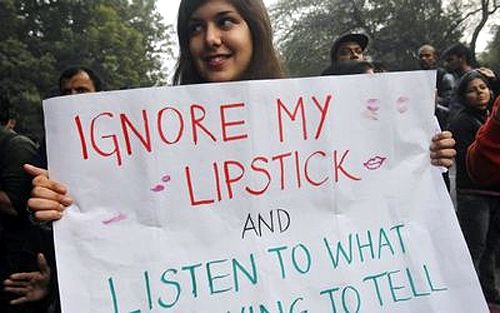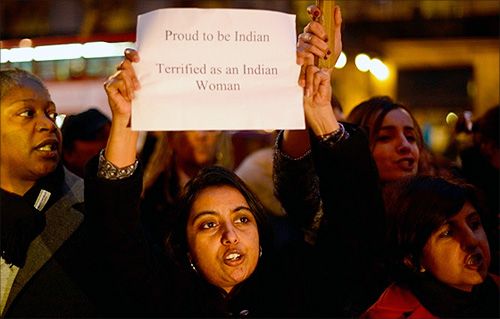India's still male-dominated corporate environment wittingly and unwittingly contrives to put women employees on the back foot in myriad imperceptible ways, notes Kanika Datta.

Photograph: Mansi Thapliyal/Reuters
Several high-profile and unedifying examples have confirmed what we suspected for decades: sexual harassment in the Indian white collar workplace is alive.
The mechanisms to address this problem are imperfect, but the internal complaints committees that are mandated in organisations as a result of Visakha judgment of 1997 have been a game changer.
This is but one baby step, though. Sexual harassment is the extreme end of gender discrimination in corporations. As critical for managements is making the corporate atmosphere genuinely gender inclusive.
This is tricky territory: after all, women can't formally complain about some indefinable feeling of exclusion to a complaints committee or pretty much anyone.

Yet, India's still male-dominated corporate environment wittingly and unwittingly contrives to put women employees on the back foot in myriad imperceptible ways.
Much of this discomfort doesn't necessarily involve outright bad behaviour; it's more about the small change of daily organisational life.
For instance, many organisations in India do not provide separate toilets for men and women, even though they may have women employees.
Others think nothing of locating their offices in remote places without providing the benefit of office transport so as to deter women from working late or after office hours.
This omission puts women, especially those in sales and marketing jobs, at a competitive disadvantage. In a country in which the public safety of women is non-existent, this is a huge issue.

Yet this issue rarely occurs to men who still make up the majority of the management - often the same men who are unlikely to allow their daughters or wives to work in similar organisations.
Working after office hours is a unique prerogative of the Indian male who is socialised to abdicate from housework and child-rearing duties with impunity.
The enlightened CEO of the Indian subsidiary of a global IT corporation sorted that one out quite creatively. He found that his male colleagues tended to call for meetings after 6 pm that would often go on late into the night.
This practice can't be formally called harassment or even discrimination (at least in India) but it is, since it automatically excludes women peers who often need to go home to their children or to household duties.
So a rule was set: no meetings after 6.30 pm - and the gulf was bridged. Sure, working from home is an option for the multi-tasking women these days but the advantage of face-to-face meetings remains unmatched.

It is true that there are enlightened men today who shoulder the same responsibilities as their wives. But gender stereotyping often constrains them.
It's somehow okay for a woman to take time off to look after an ailing child, for a father to do so is considered an exception, something to be done only if the wife is unavailable for one reason or another.
Tied in with this is the whole male bonding thing. These informal fraternities are harmless in themselves. But in an environment in which women are in a small minority or in jobs that are too disparate to create sororities, office bromances with their in-jokes and risque, locker-room antics can be oddly exclusionary too.
Too often, the boss, trying to be "one of the guys", rounds up his male colleagues for a trip to the local bar, an activity in which few Indian women can participate.
Views that are simply ignored at meetings, that's another common problem. It may be hard for men to comprehend but casual sexism can be as stressful as outright harassment.
Then there's the issue of helping women employees in the external environment. Women in customer- or client-facing jobs are all too familiar with the casual sexism or outright harassment from clients.

How do we tackle this one? It is possible for internal complaints committees to take cognisance of these transgressions but in truth, there is little that can be done beyond that unless the situation is serious enough to warrant a police case.
Women are told to grin and bear it in the interests of business; few organisations have the morale fibre to stand up for women employees who have been sexually harassed by clients.
The arguments set out above may be unfair to the many multinationals who have worked hard to establish gender-friendly practices - from creches to counselling services for expectant and returning mothers, paternity leave and so on. But they are so exceptional as to attract awed comment in the press.
Most of India's companies are still to appoint internal complaints committees let alone sensitise their employees to gender issues.
We may have addressed sexual harassment in the workplace. But the gender inclusive workplace? That's got a long way to go.








